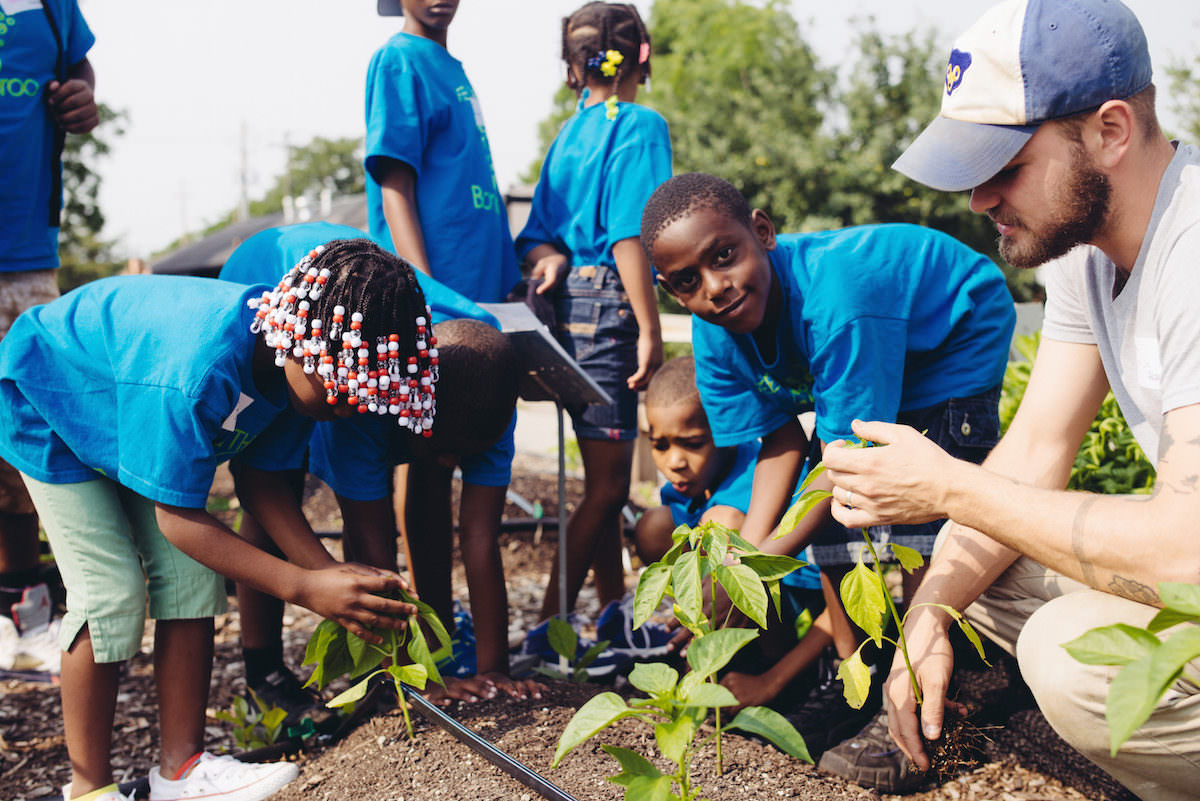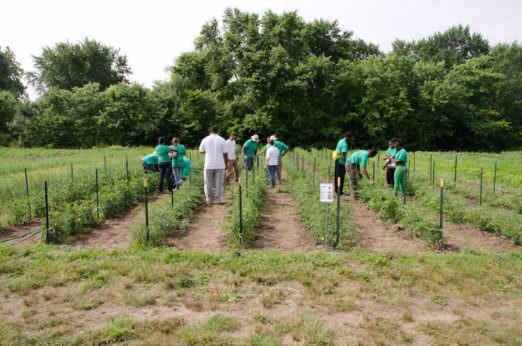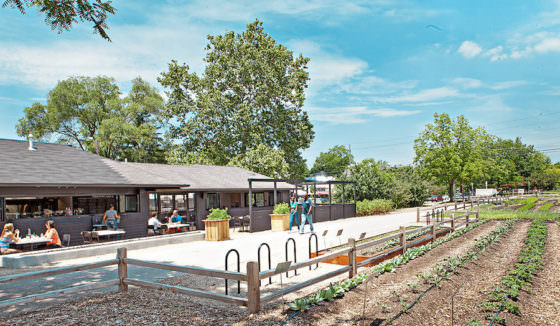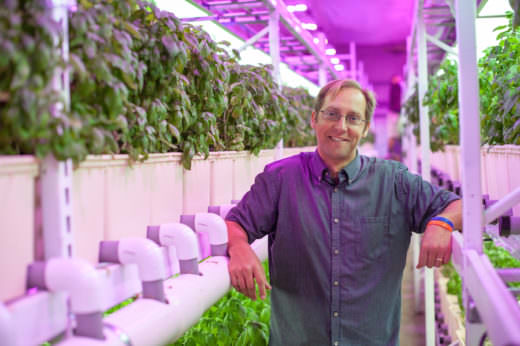Indianapolis’ Urban Farms Help Tackle Urban Problems
Indianapolis has an outsized food access problem, but a number of mission-driven urban farms are helping to turn the problem around.
Indianapolis’ Urban Farms Help Tackle Urban Problems
Indianapolis has an outsized food access problem, but a number of mission-driven urban farms are helping to turn the problem around.

In this city of a little less than a million people, Indianapolis has an outsized problem with food insecurity. In 2014, it topped the real estate company Redfin‘s list of worst cities for food access. Over the last few years a number of diverse organizations have banded together to deal with the issue, creating unique partnerships that have resulted in an urban farm that donates all its produce to food banks, a restaurant – complete with micro-farm – where the proceeds go to feeding food-insecure students, and a high-tech hydroponic farm that provides jobs for folks who need a second chance. Modern Farmer spoke with several of the people involved in these projects to see how they are dealing with food insecurity in their city.
Indy Urban Acres
In 2011, Indy Urban Acres was born out of a partnership between the Indianapolis Parks Department, the non-profit Indianapolis Parks Foundation, Indiana University Health, Gleaners Food Bank, and with the support of The Glick Fund, Indianapolis Power & Light and CLIF Bar Family Foundation. According to Tyler Gough, the farm manager for Indy Urban Acres, these groups pulled together “whatever resources they had” to provide organic produce for the 150,000 food-insecure residents of the city. The 35,000 pounds of fruits and vegetables they grow each year on five acres of an eight-acre organic farm (the other three acres are used as educational space) goes to local food pantries.
“Sadly, for families in need, fresh produce, let alone organic produce, is simply out of reach,” Gough tells Modern Farmer in an email.
“Teaching people that they can have control over their own nutrition is the most important task,” – Tyler Gough, Indy Urban Acres farm manager.
Gough says getting fresh produce to food insecure families is just the “tip of the iceberg” for dealing with food insecurity. Beyond food deserts, economic issues, and the prevalence of unhealthy food options, education is the key. “Teaching people that they can have control over their own nutrition is the most important task,” he says.
Each year thousands of children come to the farm for tours and workshops so they can get to see food growing and learn how to grow their own. Gough hopes the kids leave Indy Urban Acres as future farmers who can “imagine the possibilities of green space in an urban environment.”

Patachou Foundation & Public Greens Urban Kitchen
Like Indy Urban Acres, the Patachou Foundation and Public Greens Urban Kitchen – a restaurant and micro-farm run by the company behind the foundation, Patachou Inc. – education is intertwined with their mission of feeding children and young adults impacted by homelessness and hunger. The foundation, which was started by the restaurateur Martha Hoover in 2013, provides fresh, healthy after-school meals (and lunches in the summer) to students from Indianapolis-area schools.
According to Matthew Feltrop, the foundation’s executive director, about 87 percent of the student in the schools they serve come from low-income households. Many live in areas of the city with no access to healthy food, due in part to the closing of several grocery stores in these neighborhoods. This, and the added problem of unhealthy food choices that can lead to healthcare issues, have left many Indianapolis youngsters facing “an unparalleled health and hunger crisis,” says Feltrop.
But besides filling bellies, the foundation also teaches students how to make healthier choices through hands-on lessons that accompany the meals. The students learn about nutrition and how it impacts health, where their food comes from, and table manners, among other lessons, says Feltrop.
Public Greens, the foundation’s restaurant and micro-farm, is unique in that its profits and produce go to feeding kids through the foundation. Patachou teamed up with Growing Places Indy, a non-profit organization with a mission to empower individuals through urban agriculture, food access and education, to manage the micro-farm.

Farm 360
The city’s newest urban agricultural venture, Farm 360, was launched late last year with the twin missions of employing local folks, especially those who been incarcerated and have had a hard time finding good work, and repurposing blighted properties in the city’s Near Eastside neighborhood. The company is also growing vegetables using a hydroponic system that incorporates LED lighting, which uses 60 percent less electricity then traditional lighting systems.
The guiding light behind the venture is Jim Bloom, a former prison chaplain and staffing company owner, who saw first-hand the employment issues people who have served time often have. After developing a personal interest in hydroponic farming and helping launch an indoor farm in Ohio, he joined forces with Englewood CDC, a neighborhood redevelopment corporation, and several local business people to launch Farm 360 in Indianapolis. According to the company’s general manager, Chris Arnold, they currently have 15-full time employees, three of whom have previously served jail time, with plans to hire a total of about 25 employees (with an eye towards other hard to employ folks and those from the neighborhood where the farm is located).
“Jim always wanted to employ people in urban neighborhoods, many with historic background issues, and change food systems,” Joe Bowling, the co-director of Englewood CDC, a majority owner in Farm 360, tells Modern Farmer in a recent phone interview. “It was exactly what I felt like we needed in terms of the ability to create jobs and to produce food in what is a kind of food desert in our urban Indianapolis neighborhood.”
The farm is currently growing more than 25 different greens and herbs with plans to move into vine crops next year. They’re selling to several local restaurants, a large retail customer, and are in contract negotiations with a major school system and are in ongoing talks with two of the larger hospitals in the city, according to Chris Arnold, Farm 360’s general manager. They are in the midst of expanding the growing space in the 61,000-square foot space and have plans to open a second farm in the same neighborhood, and the intent of expanding regionally in the future, says Bowling.
It’s Making An Impact
Arnold believes Indianapolis is ahead of the curve as far as mission-driven urban agriculture is concerned. This view is shared by Gough, the farm manager from Indy Urban Acres, who says while he would like to think the city is leading the way in this area, he knows for sure that the community is trying innovative ways to end hunger. Both Indy Urban Acres and Patachou Foundation’s founder, Martha Hoover, have been recognized for the work they are doing. Last year Indy Urban Acres was given a $100,000 grant to help in their mission by the non-profit Impact 100, while Hoover was recognized for her work by Jefferson Awards Foundation.

Follow us
This work is licensed under a Creative Commons Attribution-NoDerivatives 4.0 International License.
Want to republish a Modern Farmer story?
We are happy for Modern Farmer stories to be shared, and encourage you to republish our articles for your audience. When doing so, we ask that you follow these guidelines:
Please credit us and our writers
For the author byline, please use “Author Name, Modern Farmer.” At the top of our stories, if on the web, please include this text and link: “This story was originally published by Modern Farmer.”
Please make sure to include a link back to either our home page or the article URL.
At the bottom of the story, please include the following text:
“Modern Farmer is a nonprofit initiative dedicated to raising awareness and catalyzing action at the intersection of food, agriculture, and society. Read more at <link>Modern Farmer</link>.”
Use our widget
We’d like to be able to track our stories, so we ask that if you republish our content, you do so using our widget (located on the left hand side of the article). The HTML code has a built-in tracker that tells us the data and domain where the story was published, as well as view counts.
Check the image requirements
It’s your responsibility to confirm you're licensed to republish images in our articles. Some images, such as those from commercial providers, don't allow their images to be republished without permission or payment. Copyright terms are generally listed in the image caption and attribution. You are welcome to omit our images or substitute with your own. Charts and interactive graphics follow the same rules.
Don’t change too much. Or, ask us first.
Articles must be republished in their entirety. It’s okay to change references to time (“today” to “yesterday”) or location (“Iowa City, IA” to “here”). But please keep everything else the same.
If you feel strongly that a more material edit needs to be made, get in touch with us at [email protected]. We’re happy to discuss it with the original author, but we must have prior approval for changes before publication.
Special cases
Extracts. You may run the first few lines or paragraphs of the article and then say: “Read the full article at Modern Farmer” with a link back to the original article.
Quotes. You may quote authors provided you include a link back to the article URL.
Translations. These require writer approval. To inquire about translation of a Modern Farmer article, contact us at [email protected]
Signed consent / copyright release forms. These are not required, provided you are following these guidelines.
Print. Articles can be republished in print under these same rules, with the exception that you do not need to include the links.
Tag us
When sharing the story on social media, please tag us using the following: - Twitter (@ModFarm) - Facebook (@ModernFarmerMedia) - Instagram (@modfarm)
Use our content respectfully
Modern Farmer is a nonprofit and as such we share our content for free and in good faith in order to reach new audiences. Respectfully,
No selling ads against our stories. It’s okay to put our stories on pages with ads.
Don’t republish our material wholesale, or automatically; you need to select stories to be republished individually.
You have no rights to sell, license, syndicate, or otherwise represent yourself as the authorized owner of our material to any third parties. This means that you cannot actively publish or submit our work for syndication to third party platforms or apps like Apple News or Google News. We understand that publishers cannot fully control when certain third parties automatically summarize or crawl content from publishers’ own sites.
Keep in touch
We want to hear from you if you love Modern Farmer content, have a collaboration idea, or anything else to share. As a nonprofit outlet, we work in service of our community and are always open to comments, feedback, and ideas. Contact us at [email protected].by Andrew Amelinckx, Modern Farmer
November 4, 2016
Modern Farmer Weekly
Solutions Hub
Innovations, ideas and inspiration. Actionable solutions for a resilient food system.
ExploreExplore other topics
Share With Us
We want to hear from Modern Farmer readers who have thoughtful commentary, actionable solutions, or helpful ideas to share.
SubmitNecessary cookies are absolutely essential for the website to function properly. This category only includes cookies that ensures basic functionalities and security features of the website. These cookies do not store any personal information.
Any cookies that may not be particularly necessary for the website to function and are used specifically to collect user personal data via analytics, ads, other embedded contents are termed as non-necessary cookies.